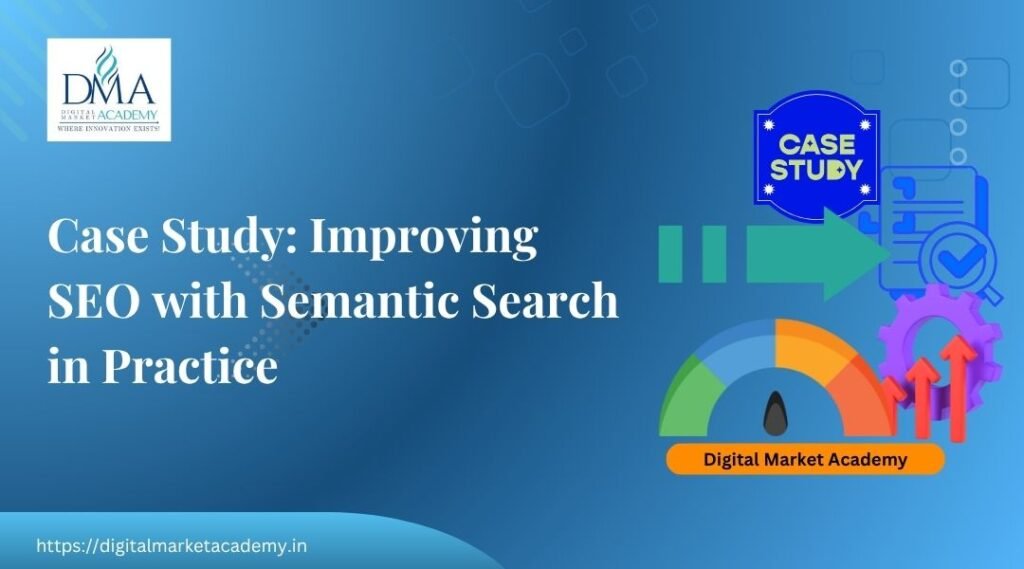How Semantic Search Helped One Website Improve SEO Significantly
Introduction
Improving SEO with semantic search is no longer optional in 2025, it’s essential. As search engines evolve to understand context, relationships, and user intent, websites that embrace semantic SEO gain a major competitive edge.
In this in-depth case study, we’ll explore how one Indian education-based website transformed its SEO strategy by adopting structured data, NLP optimization, and AI-assisted content planning. Whether you’re a digital marketer, business owner, or student, this case study offers powerful insights into the real-world impact of semantic SEO.
Background: The SEO Challenges Faced
In early 2024, a mid-sized educational platform struggled with:
- Low organic traffic despite regular blog posting
- Poor click-through rates (CTR) even when ranking on page one
- Content mismatch with user search intent
- No featured snippets or AI Overview inclusion
The site had good technical SEO but lacked semantic clarity and contextual structure, a gap search engines can’t overlook in the age of AI.
Step 1: Content Audit and Intent Mapping
The first step toward improving SEO with semantic search was a thorough content audit. Here’s what was done:
Audit Element | Before Semantic Optimization | After Semantic Optimization |
Keyword Targeting | Exact-match keywords only | Intent-based and entity-focused terms |
Internal Linking | Minimal and inconsistent | Contextual, topic-cluster-based linking |
Content Relevance | Generic content | Deep, focused topics aligned with search intent |
Schema Markup | Missing or minimal | Rich JSON-LD structured data added |
Outcome: 30% of old blog posts were retired or merged, while 70% were rewritten to match modern search intent.
Step 2: Integrating NLP and Entity SEO
Using tools like Surfer SEO, Frase, and Google’s NLP API, content was restructured with semantic relevance. Here’s how:
- Entities and topics were identified in top-ranking pages.
- Each blog post was updated to answer questions and address related concepts
- NLP techniques ensured the text included contextual synonyms, related terms, and semantic variations.
Example:
- Instead of using just “SEO tools”, the new version included phrases like “AI-powered optimization platforms”, “search visibility improvement tools”, and “semantic audit tools.”
Step 3: Adding Structured Data (Schema Markup)
To reinforce meaning for search engines, the team implemented schema using JSON-LD, including:
- Article for blogs
- FAQPage for question sections
- EducationalOrganization for the brand
- LocalBusiness for regional presence
- Breadcrumb and WebPage for hierarchy
Validating each schema on Google’s Rich Results Test ensured no errors. This step played a major role in getting selected for featured snippets and AI overviews.
Step 4: Results Achieved After 90 Days
Within 3 months, these were the measurable results:
Metric | Before | After Semantic Optimization |
Organic Traffic (Monthly) | 4,200 | 11,800 (▲180%) |
Featured Snippets | 1 | 9 |
Keywords in Top 3 | 28 | 81 |
CTR on Blog Pages | 2.3% | 4.7% |
Avg. Time on Page | 41 seconds | 2 minutes 22 seconds |
This dramatic improvement was driven not just by keywords, but by relevance, structure, and meaning.
Our real-world SEO results using semantic strategies are promising.
To put them in context and build a scalable plan of your own, don’t miss the complete blueprint:
Semantic Search and SEO in 2025: The Future of Search Engines and How to Optimize.
This pillar post lays the foundation for all things semantic in modern SEO.
Lessons from This Semantic SEO Case Study
✅ Focus on Entities and Intent, Not Just Keywords
Traditional keyword stuffing doesn’t work anymore. Instead, aligning with searcher intent and adding semantic depth is key.
✅ Use NLP to Build Topical Authority
By analyzing what Google associates with a topic, you can build richer, multi-dimensional content that performs better.
✅ Schema Markup Isn’t Optional
To get noticed by search engines (and AI systems), you must speak their language and schema markup is that language.
✅ AI Tools Help, But Strategy Wins
While tools like Jasper, ChatGPT, and MarketMuse assist content generation, human strategy and understanding of audience pain points are essential.
How Digital Market Academy in Bangalore Applies These Strategies
At Digital Market Academy in Bangalore, we don’t just teach theory, we implement it.
Our Classroom Digital Marketing Courses and On-Campus SEO Training Programs for Colleges now include hands-on training in:
- Semantic SEO frameworks
- Schema implementation (JSON-LD)
- NLP tools for content optimization
- AI-assisted SEO content planning
We believe that mastering semantic search is crucial for anyone building a career in modern digital marketing.
Whether you’re a student, startup, or marketing professional, our training gives you the real-world skills to succeed in today’s AI-driven SEO landscape.
Explore our courses or get in touch to enroll.
FAQs on Improving SEO with Semantic Search
Semantic search is a search technology that understands the intent behind a query and the context of words. It goes beyond exact matches to deliver more relevant, personalized results.
Structured data helps search engines understand your content better. It enables rich snippets, AI Overviews, and boosts visibility, even if rankings stay the same.
No. Any website, big or small, benefits from semantic search optimization. Even local businesses can increase reach and relevance through better context and structure.
Tools like Frase, Surfer SEO, ChatGPT, MarketMuse, and Google NLP API help analyze, optimize, and expand your content semantically.
Yes! Our Digital Marketing Classroom Courses and On-Campus Training Programs in Bangalore include advanced modules on semantic SEO, structured data, and AI-based content strategies.
Final Thoughts
Knowing how to approach improving SEO with semantic search can unlock massive organic growth, just like in this case study. The key is to shift from keywords to concepts, from volume to value, and from rankings to relevance.
If you’re serious about learning and applying these techniques, Digital Market Academy in Bangalore is your trusted guide. Join us to master the future of SEO today.


Rajesh Menon is a leading digital marketing trainer and strategist based in Bangalore, with over 15 years of experience in SEO, advertising, and digital growth planning. As the Founder and CEO of Digital Market Academy, he is known not just for his ability to teach, but for his visionary thinking and deep strategic insight.
At the academy’s Kasturinagar center, Menon leads classroom training programs and digital marketing boot camps. He also conducts on-campus sessions at colleges for undergraduate and postgraduate students, and provides digital enablement workshops for MSMEs and startups. His approach blends practical execution with long-term strategy, making him a trusted mentor for aspiring marketers and small business owners alike.
Rajesh writes regularly on the Digital Market Academy blog, and also shares expert content on Medium and LinkedIn, where his work is followed by both learners and industry peers.
You can find links to his Medium and LinkedIn profiles in the author box below.




